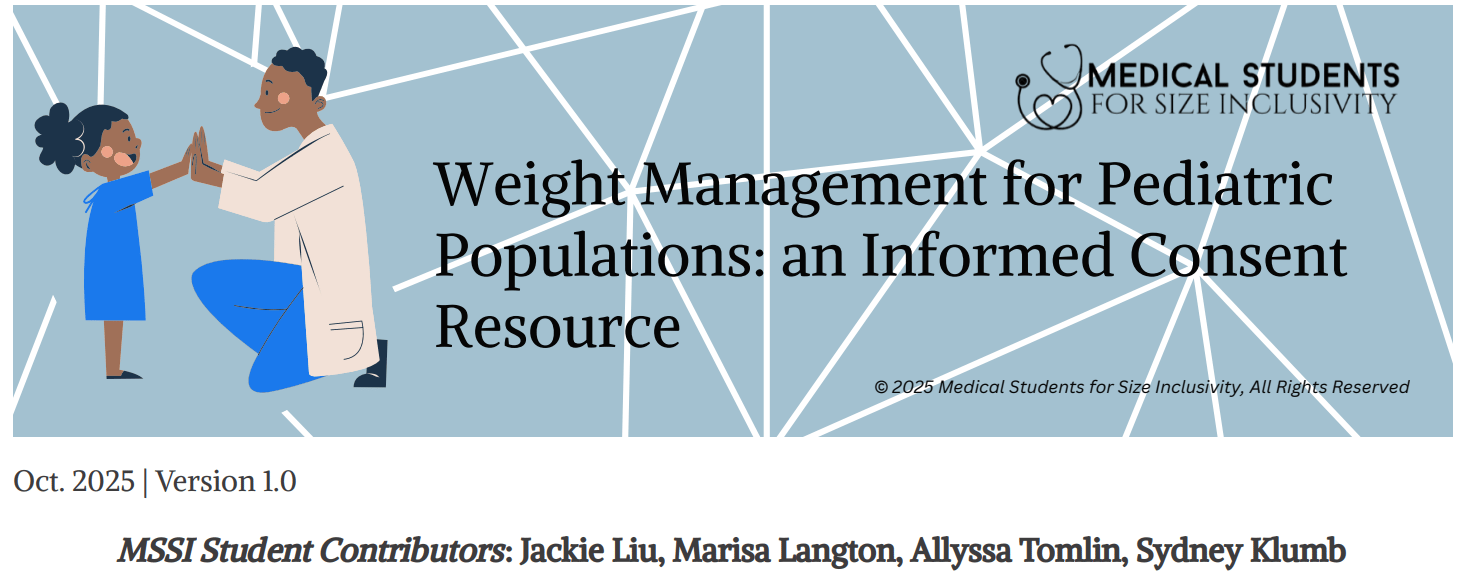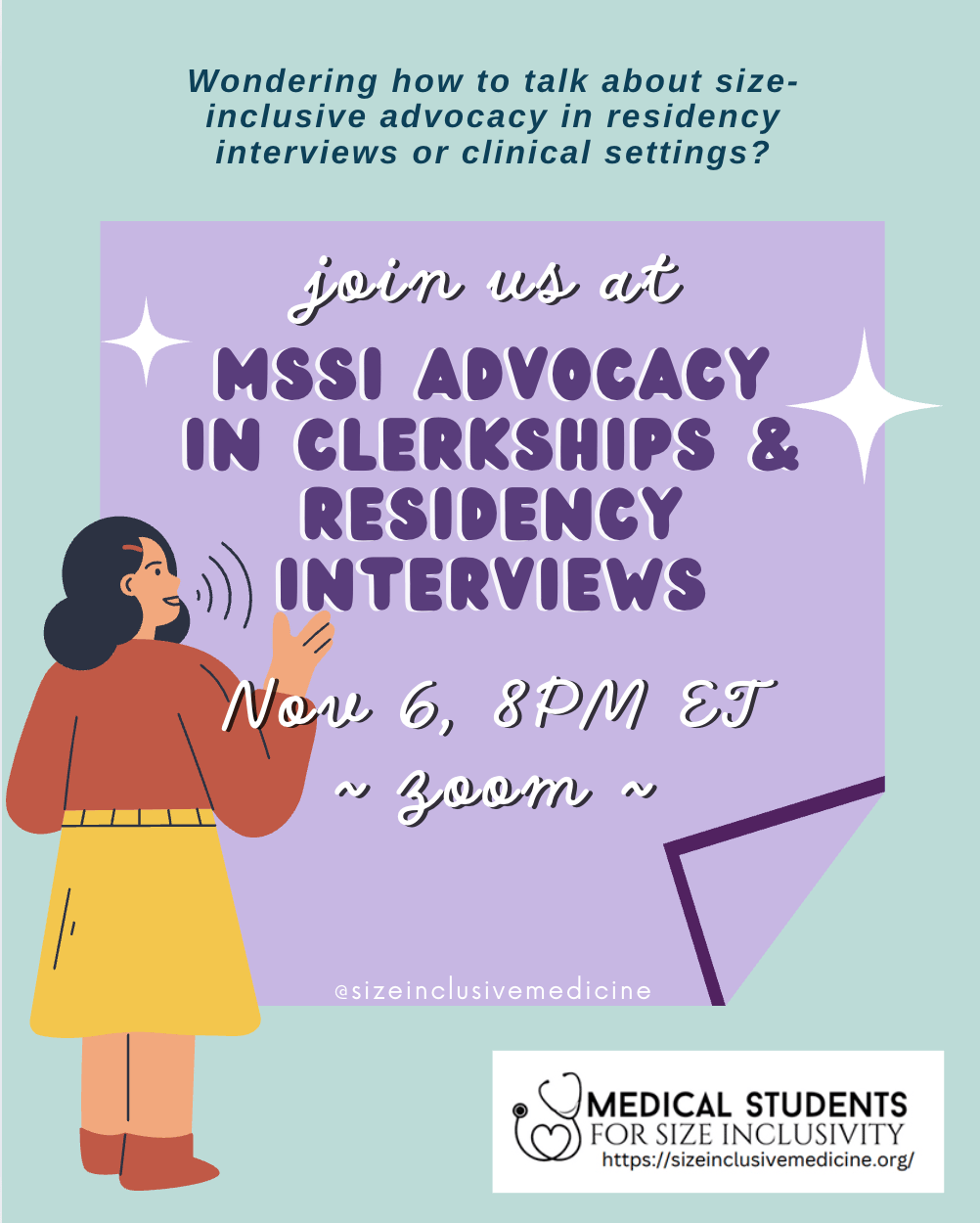- Medical Students for Size Inclusivity's Newsletter
- Posts
- November 2025 Newsletter
November 2025 Newsletter

In this issue:
NEW MSSI Resource: Pediatric Weight-Management Informed Consent Project
Upcoming Event: MSSI Advocacy in Clerkships and Residency Interviews
Reflections on AWSIM’s 2025 Fall Symposium
NEW MSSI Resource: Pediatric Weight-Management Informed Consent Project

MSSI is excited to announce a NEW informed consent resource on Weight Management for Pediatric Populations, authored by MSSI Advocacy Co-leads Jackie Liu and Marisa Langton, Curriculum Committee member Allyssa Tomlin, and MSSI member Sydney Klumb!
This is a parent-facing resource describing and explaining the risks and benefits of different weight loss interventions that pediatricians may recommend, as well as weight-neutral approaches to supporting overall childhood health and wellbeing. In light of current AAP guidelines around management of childhood “o**sity” (read more about issues with the guidelines here), this document may help parents navigate potentially unsolicited advice on weight management for their child. While MSSI does not agree that weight and health are directly linked, we respect individual choices and the process of shared decision-making and hope that this resource will help guide trauma-informed and compassionate conversations.
Browse our other informed consent projects on GLP-1s and bariatric surgery.
MSSI is working on a version of this resource for kids! If you are interested in contributing to our work, please reach out to [email protected].
Upcoming Event: MSSI Advocacy in Clerkships and Residency Interviews

Thursday, November 6, 2025, 8:00pm ET (via Zoom)
As advocates, we often find ourselves in conversations with those whose views or beliefs may not be aligned with our own. While such conversations can be an important part of advancing any important cause, this dynamic can be especially challenging when being evaluated, such as during residency interviews and clerkships. Medical Students for Size Inclusivity (MSSI) is hosting this event to foster connection and communication between student advocates and to provide a space for students to share their experiences and tips on speaking about size-inclusive advocacy. Together, we can empower and support each other as we all take the next step in our medical careers!
This event is only open to students.
Healers, Educators, Students, and Activists Convene in Community at Association for Weight and Size Inclusive Medicine’s Inaugural Fall Symposium

On October 24th 2025, size-inclusive healthcare professionals, educators, activists, and students gathered for the Association for Weight and Size Inclusive Medicine (AWSIM)’s first annual fall symposium, “Building Community – Supporting Patients and Each Other.” The symposium featured educational presentations, panel discussions, and a networking and community-building session, facilitating valuable opportunities for connection and education.
The virtual symposium opened with a presentation by AWSIM’s president Dr. Lisa Erlanger, which was followed by a clinical practice didactic led by Dr. Stephanie Hart. These were followed by panel discussions moderated by Dr. Erin Knopf and AWSIM’s Education Committee Chair Dr. Anna Whelan. Panel topics included size-inclusive advocacy in medical education and perspectives on sustaining advocacy and self-care in today’s medical climate. Panel speakers consisted of MSSI Co-Director Jessica Rosenblum, MSSI Curriculum Lead Abigail Faust, AWSIM Vice President Dr. Katarina Wind, UMass Clinical Psychologist Dr. Cathryn Williams, Harvard Medical School Instructor and Family Medicine Physician Dr. Madhuri Rao, Family Medicine Physician Dr. Anna Mirer, NAAFA Executive Director Tigress Osborn, and Angel Austin, Founder of Sacred Space for Fat Bodies.
Educational elements of the symposium focused on communicating a vision of healthcare aimed at supporting bodies of all sizes, rather than care aimed simply at mitigating barriers in a medical system that remains intent on pathologizing and eliminating fat and disabled bodies. In Dr. Erlanger’s opening presentation, “Beyond the Blood Pressure Cuff,” examples of improper vaccine administration and drug dosing were cited to demonstrate that lack of evidence and poor practice guidelines likely play a significant role in perpetuating health disparities traditionally blamed on being higher weight. Erlanger described the necessity of advocacy that moves beyond “access” (to appropriately sized blood pressure cuffs, needles, and gowns) and towards the direct challenge and dismantling of weight stigma. Only once we create a more equitable system, rather than improving access to the current, flawed, system, can research, policy, and education truly advance effective and compassionate care for the fat body. In “Sexual Function: The Intersection of Medical and Societal Weight Stigma,” Dr. Hart contributed to this vision with a presentation that shared evidence of weight bias within physician communities, argued against BMI-based management of sexual dysfunction, and described a potential road map to weight-inclusive sexual health counseling that is trauma-informed, accessible, and inclusive.
Community-building was another key feature of the event. Panelists shared memorable stories of advocating for size-inclusive and weight-neutral care in their own clinical practices, classrooms, and personal lives. A lively Zoom group chat contributed a steady stream of resources, encouragement, and wisdom. The symposium ended with virtual breakout groups that allowed participants to socialize, share advice, and learn from each other. Topics that emerged from these parts of the event included the importance of supporting medical trainees experiencing weight stigma or disordered eating, opportunities for supporting medical staff and assistants in accessing education about size-inclusive care, funding organizations with liberatory fat politics, and leveraging personal stories as a powerful way to advocate for systemic change. Throughout it all, participants’ stories emphasized the importance of turning towards community both as a means of support and an act of resistance.
As one participant described, "resistance means accepting that we are interconnected, and that our health outcomes depend on more than our individual choices…ultimately, there is no one intervention that makes us immune to the impact of genetics, biology, and their interaction with our environment, a realization that fundamentally disrupts our individualistic culture.”
A full recording of the symposium will be made available for free for AWSIM members. MSSI students are entitled to free AWSIM membership; contact us at [email protected] for more information on how to access all that AWSIM has to offer.
Crowd-Sourced Symposium Resources:
Organizations to Donate To:
Did you attend AWSIM’s Fall 2025 Symposium? Let us know your thoughts.
This newsletter was authored by MSSI member Jay Liu (Stanford University)